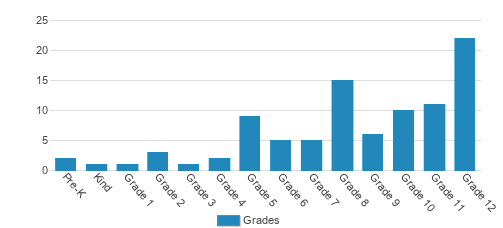Kingsbury Day School is the oldest school in Washington, D.C. designed to meet the needs of students with learning difference and ADHD. Kingsbury is a co-educational, independent, special education day school serving students ranging from 4 to 21 years of age. Learning goals are met through multi-sensory, individualized and differentiated learning approaches.
Social and emotional growth is facilitated through collaboration among a team of special education professionals which include occupational therapists, physical therapists, psychologists, speech and language pathologists and reading specialists.
School Overview
School Type
Religious Affiliation
Grades Offered
Grades Prekindergarten-12
Offers Post-Graduate Year
Yes
Learning Difference Programs
Yes
Learning Programs Supported
Mild to Moderate
Year Founded
1938
Summer School Offered
Yes
Student Body
Total Students
93 students
Student Body Type
Co-ed
% Students of Color
75%
State avg.: 45%
Students by Grade

Academics and Faculty
Total Classroom Teachers
23 teachers
Student : Teacher Ratio
4:1
National avg.: 13:1
% Faculty w/Advanced Degree
85%
Average Class Size
8 students
Number of AP Courses
3 courses
Advanced Courses
AP Human Geography, AP Psychology, AP U.S. History
Tuition and Acceptance Rate
Admission Deadline
Feb. 1 / rolling
Acceptance Rate
70%
National avg.: 85%
Sports
Total Sports Offered
6 sports
Sports
Extracurriculars
Total ExtracurricularsTotal Extra-curric.
2 extracurriculars
ExtracurricularsExtra-curric.
Club or Organization:
Student Government Association
Arts and Music Programs:
Kingsbury Day School Chorus
Student Government Association
Arts and Music Programs:
Kingsbury Day School Chorus
School Notes
- Kingsbury serves 165 students with average to above average cognitive ability. Our population includes students with mild to moderate auditory and visual processing disorders, students with non-verbal learning disabilities, ADHD, visual and spatial processing disorders as well as evaluative and organizational processing disorders. We are unable to meet the needs of students with a primary diagnosis of Mental Retardation, PDD and/or Emotional Disturbance. Students progress through a curriculum of concepts and skills at their own pace in our individualized academic program. We believe that students with learning differences can be taught effectively when instructional methods and curricula are tailored to their unique learning needs.
Source: Verified school update
Frequently Asked Questions
What is the acceptance rate of Kingsbury Day School?
The acceptance rate of Kingsbury Day School is 70%, which is higher than the national average of 59%.
What sports does Kingsbury Day School offer?
Kingsbury Day School offers 6 interscholastic sports: Basketball, Cheering, Flag Football, Soccer, Tennis and Track and Field.
When is the application deadline for Kingsbury Day School?
The application deadline for Kingsbury Day School is Feb. 1 / rolling (applications are due on Feb. 1 but additional applications are reviewed year-round as space permits ).
Recent Articles

A Parent's Guide To Understanding High School Teaching Methods
This comprehensive guide helps parents navigate the various teaching methods used in today's high school classrooms. By understanding these approaches, you'll be better equipped to support your teen's learning journey, communicate effectively with teachers, and create a complementary learning environment at home.

February 08, 2025
Social Emotional Learning: Education's Hidden SymphonyA musician's perspective on Social Emotional Learning reveals how this educational framework orchestrates success through five essential emotional competencies.

January 24, 2025
A Roadmap For Starting A Private SchoolUse this roadmap as a set of talking points with your trusted mentors and professionals to start the private school of your dreams. You're not alone. Over the years, hundreds of folks like you have had the same dream. From Quintilian to Maria Montessori to Lucy Madeira Wing, visionary educators have established schools to teach according to their beliefs and methodologies.















